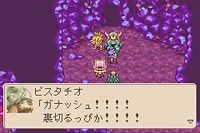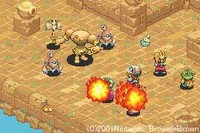|
|

|
PLATFORM
|
GBA
|
BATTLE SYSTEM
|

|
INTERACTION
|

|
ORIGINALITY
|

|
STORY
|

|
MUSIC & SOUND
|

|
VISUALS
|

|
CHALLENGE
|
Hard
|
COMPLETION TIME
|
20-40 Hours
|
|
OVERALL

|
+ Unique feel and world
+ Interesting combat
+ Well-varied dungeons
- Nasty enemies later on
- Optional portions require linking
- Too many elements to keep track of
|
Click here for scoring definitions
|
|
|
Back when the Game Boy Advance was a new piece of hardware, most of the RPGs on the system were ports of older games. Magical Vacation was one of the few original creations to come forth during the system's early months, and for a time it even appeared that Nintendo would grace the world with a localization. That unfortunately did not come to pass, and only Japan was able to take this Vacation. Brownie Brown's creation is not a title that would have been a system seller, but the interesting things it does make the game worth sampling even so.
Magical Vacation begins with a group of students at a magic academy going on a field trip to the beach. The fun stops abruptly when a number of creepy creatures called Enigma show up to sweep the students away. The initial goal of the silent player-named protagonist is simply to reunite with the many classmates scattered about a new locale by the Enigma. The ability of the Enigma to fuse with willing to attain power at any cost begins to drive events later, as a couple of classmates are tempted by such an offer.
Searching for lost classmates in a number of outlandish locales is an atypical RPG pursuit, but it doesn't really deliver as a riveting narrative. The lighthearted feel to most of the proceedings compensates somewhat for that, and a sense of urgency does eventually appear once the party reaches something gloomily named the Death Plane. Being in Japanese with no translation, the narrative will at any rate have comparatively little interest for players elsewhere.
At first Magical Vacation's turn based combat might look similar to innumerable other RPGs save for having a battle party of six. What immediately distinguishes it from other games is the sheer quantity of elements at play, numbering a total of sixteen. Using a magic attack against something with the same element will deal a total of one HP in damage, but the relationships between all the other attributes are fairly complex. Getting a team together to handle every possible scenario is impossible due to the profusion of attributes, and keeping some characters in reserve for a switch in enemy strengths requires manually leveling everyone since the game does not give any experience to those not in combat.
 Pistachio has many powers. Whining incessantly seems to be one of them.
Pistachio has many powers. Whining incessantly seems to be one of them.
|
|
Further making Magical Vacation's combat feel akin to a tactical game is the six block grid both parties occupy. Only the most powerful spells of some elements target everything, and some never gain access to anything that will hit every opposing spot. Physical attacks are always an option, and some enemies take little damage from anything else, but the fact that characters replenish a percentage of their magic points with every round means that the standard method resource management is not applicable.
Enemies in Magical Vacation start out as nothing to be overly concerned with, and stay manageable for the majority of the game. Later areas don't rely on having enormous HP levels for the opposition — nothing in the game surpasses triple digits. The enemies instead like to hit very hard and take advantage of the game's spirit summoning system. All participants have the ability to summon a spirit of an element instead of directly attacking, which will double the power of the next onslaught using that type. Summoning more spirits multiplies the attack power at a geometric rate, and the result is extremely painful. It doesn't help that many powerful enemies use dark magic which is strong against thirteen other varieties. Sometimes dealing with enemies that insist upon summoning lots of spirits is as simple as bringing out and using an opposing elemental, as it will then also make the other attribute vanish. This solution is frequently unavailable due to the sheer number of spirits in the game, but it can make the difference between victory and defeat.
Healing is another aspect of Magical Vacation that doesn't operate by the standard rules. Only one character knows healing spells, and they replenish HP based on how many MP she currently has. For most of the game this is sufficient, and some handy pots are located in most dungeons for emergency HP refills, but near the end running through item stocks will be mandatory to recover from the brutal encounters. The steadily increasing difficulty is not necessarily a bad thing since the game makes healing supplies and warping spots readily available, but it does serve to make encounters near the end even more time-consuming.
The nastiness of the enemies is an interesting contrast with the cute and colorful presentation. The developers helpfully made the environments bright and colorful for easy viewing on the GBA's screen, and the characters in particular resemble those from the Mana series Brownie Brown's employees had worked on for Squaresoft. For a first generation title the visuals acquit themselves quite well, and several locations are quite impressive. The music does its best, but the low fidelity of the GBA's speakers and a few dungeon themes that are rather boring get in the way.
 Being on fire is generally a bad thing. This is no exception.
Being on fire is generally a bad thing. This is no exception.
|
|
Keeping the visual aesthetic interesting is the variety of action that takes place in Magical Vacation's environments. A dungeon with deep grass in which mobile warp engines must be caught, a transparent star-studded field with objects that throw party members back outside, and a series of anthropomorphic rodents that conduct an extended fetch quest are some of the interesting places the game showcases. This variety does make playing it in raw Japanese somewhat more vexing, but a handy GameFAQs visit will remove that problem.
Most games make their optional content fairly obvious, but Magical Vacation ventures off the beaten path in this aspect also. Representatives of the many attributes magic can possess will be found throughout the game, and they will require a variety of things to join the player. Sometimes these items are otherwise worthless stuff that clogs the inventory, but not always, and a few spirits even demand that the gummy items used for healing be discarded to join. The purpose of this collection is to increase the number of spirits that can be called upon in battle, but the requirements for recruiting some elementals become far more trouble than they're worth. At least they're easier to obtain than the use of light and dark magic for a character, which can only be done by hooking up two copies of the game using a link cable.
For whatever reason Nintendo demurred on releasing Magical Vacation outside Japan, and like the company's other properties this precluded any other company from doing so. Those who have played Magical Starsign will doubtless be curious about the first game in the series, and many elements are shared between the two. For most of its length the game is an enjoyable smorgasbord of interesting concepts and locales that easily sets it apart from other titles. The final stretch is where it turns into a gigantic grind, because surviving the enemies late in the Death Plane is no joke. Getting past the language barrier isn't difficult with a little online help, but if other vacations ended like this one most people would stay home.
Review Archives
|









